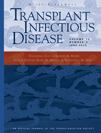Recommended curriculum for subspecialty training in transplant infectious disease on behalf of the American Society of Transplantation Infectious Diseases Community of Practice Educational Initiatives Working Group
Abstract
R. Avery, H. Clauss, L. Danziger-Isakov, J. Davis, K. Doucette, D. van Duin, J. Fishman, F. Gunseren, A. Humar, S. Husain, C. Isada, K. Julian, D. Kaul, D. Kumar, S. Martin, M. Michaels, M. Morris, F. Silveira, A. Subramanian. Recommended curriculum for subspecialty training in transplant infectious disease on behalf of the American Society of Transplantation Infectious Diseases Community of Practice Educational Initiatives Working Group.Transpl Infect Dis 2010: 12: 190–194. All rights reserved
Abstract: The American Society of Transplantation Infectious Diseases (ID) Community of Practice has established an education workgroup to identify core components of a curriculum for training specialists in transplant ID. Clinical, laboratory, and research training form the triad of components on which an additional year of ID training, dedicated to the care of solid organ and hematopoietic stem cell transplant recipients, should be based. The recommended training environment would have access to adequate numbers of transplant patients, along with qualified faculty committed to teaching specialized fellows in this area. The learning objectives for both inpatient and outpatient clinical training are presented. The laboratory component requires trainees to attain expertize in utilizing and interpreting cutting-edge diagnostics used in transplant medicine. The research component may involve basic science, and translational or clinical research individualized to the trainee. Finally, suggestions for evaluation of both the fellows and the training program are provided.




